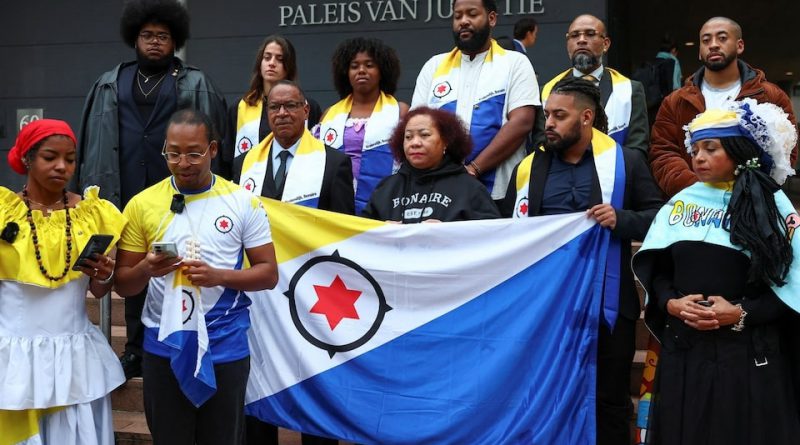Bonaire residents lead the way in climate action, urging Netherlands to set ambitious net-zero target by 2040.
Bonaire Residents and Greenpeace Push Netherlands Toward Ambitious Climate Goals
Residents of Bonaire, a picturesque Dutch-Caribbean island, are making headlines as they take a proactive stance on climate action, urging the Dutch government to accelerate its greenhouse gas reductions.
With support from environmental group Greenpeace, islanders have asked the court to require the Netherlands to target net-zero emissions by 2040, a full decade ahead of current plans, demonstrating a bold and forward-thinking approach to climate leadership.
Onnie Emerenciana, a seasoned farmer in his 60s, highlighted to the court how climate change has affected the island’s daily life, from the intense heat impacting the elderly and vulnerable populations to droughts threatening crops and rising sea levels endangering the island’s historic slave huts along its beaches.
Residents’ engagement in legal action underscores the community’s commitment to safeguarding both the environment and the cultural heritage of Bonaire for future generations.
The eight named plaintiffs, joined by Greenpeace Netherlands, are seeking a clear legal mandate for the Dutch government to enhance its climate ambitions. Their objective is to position Bonaire as a leader in climate adaptation and mitigation, aligning local action with global sustainability goals.
By advocating for a net-zero target by 2040, the islanders are pushing Europe toward setting higher benchmarks for carbon reduction and environmental stewardship.
Legal experts emphasize the significance of this case. It represents one of the first opportunities to implement lessons from the landmark 2024 European climate ruling and this year’s World Court opinion at a national level.
Lucy Maxwell of the Climate Litigation Network notes that, if successful, the case could inspire other nations to raise their climate targets, creating a ripple effect that encourages ambitious policies across the European Union and beyond.
Plaintiffs’ lawyer Michael Bacon reinforced the community’s message to the judges, stating, “Effective climate policy is not a political choice but a duty and a right.”
This principle reflects a growing global consensus that climate action must be timely, transparent, and accountable. Bonaire’s residents are leveraging their unique position as Dutch citizens to advocate for stronger national climate policies that address both mitigation and adaptation needs.
While Dutch state lawyers emphasized that government policies are currently in line with European Union climate targets, the islanders’ initiative represents an opportunity to enhance these commitments and explore new, innovative solutions for small island environments.
State attorney Edward Brans highlighted the Netherlands’ compliance with existing obligations, but the case has already stimulated constructive discussion on how national strategies can evolve to meet local and global needs more effectively.
The hearings, which continue into Wednesday, have drawn international attention, reflecting the growing trend of citizen-led climate litigation around the world.
Such legal actions serve as catalysts for policy improvements, encouraging governments to take ambitious steps toward sustainability while demonstrating that communities can play a proactive role in shaping the future of environmental governance.
Bonaire’s leadership in this effort aligns with broader climate resilience goals, including protecting coastal infrastructure, preserving biodiversity, and ensuring the health and well-being of residents.
By setting an ambitious net-zero target, the Dutch government has the opportunity to create a model for island nations globally, showing how small communities can drive meaningful climate action at the national and international level.
The case also highlights the collaborative potential between civil society organizations, local communities, and legal systems in promoting sustainable development.
Greenpeace’s involvement underscores the value of partnership between grassroots advocacy and institutional expertise in achieving impactful environmental outcomes. Bonaire’s example may inspire other communities worldwide to pursue creative and legally grounded approaches to combat climate change.
In conclusion, Bonaire’s residents are at the forefront of a new wave of climate activism, using legal channels to champion a net-zero future. Their actions demonstrate civic responsibility, environmental foresight, and cultural preservation, encouraging the Netherlands—and potentially other countries—to adopt more ambitious climate policies.
By seeking a net-zero target by 2040, Bonaire is not only protecting its own future but also setting a bold precedent for sustainable action across the globe.



